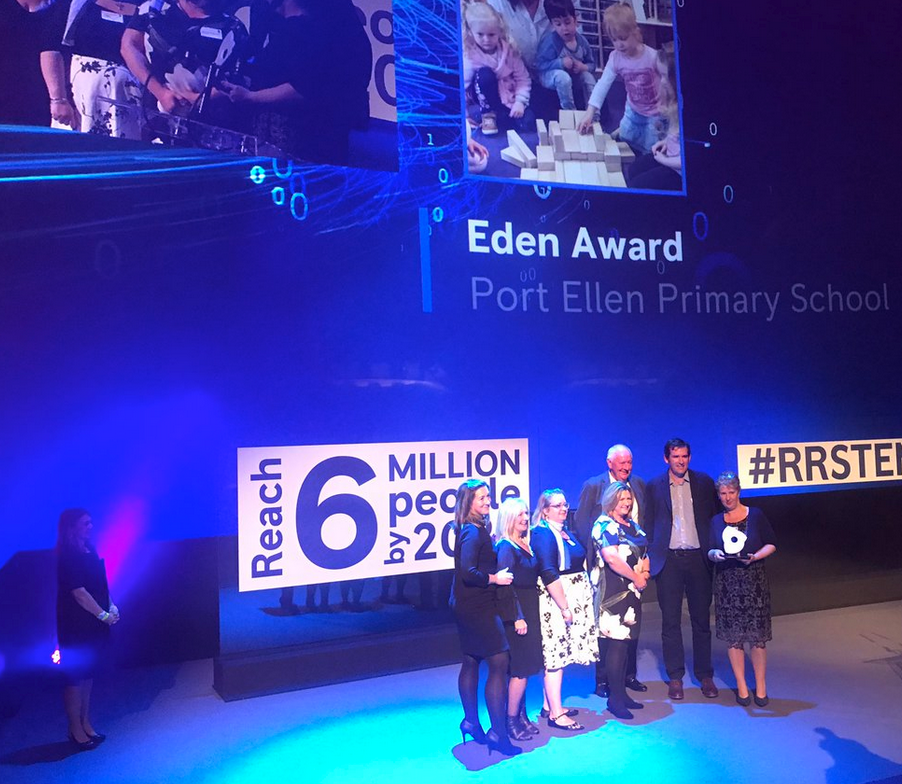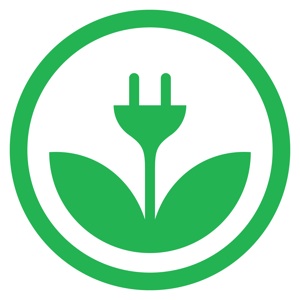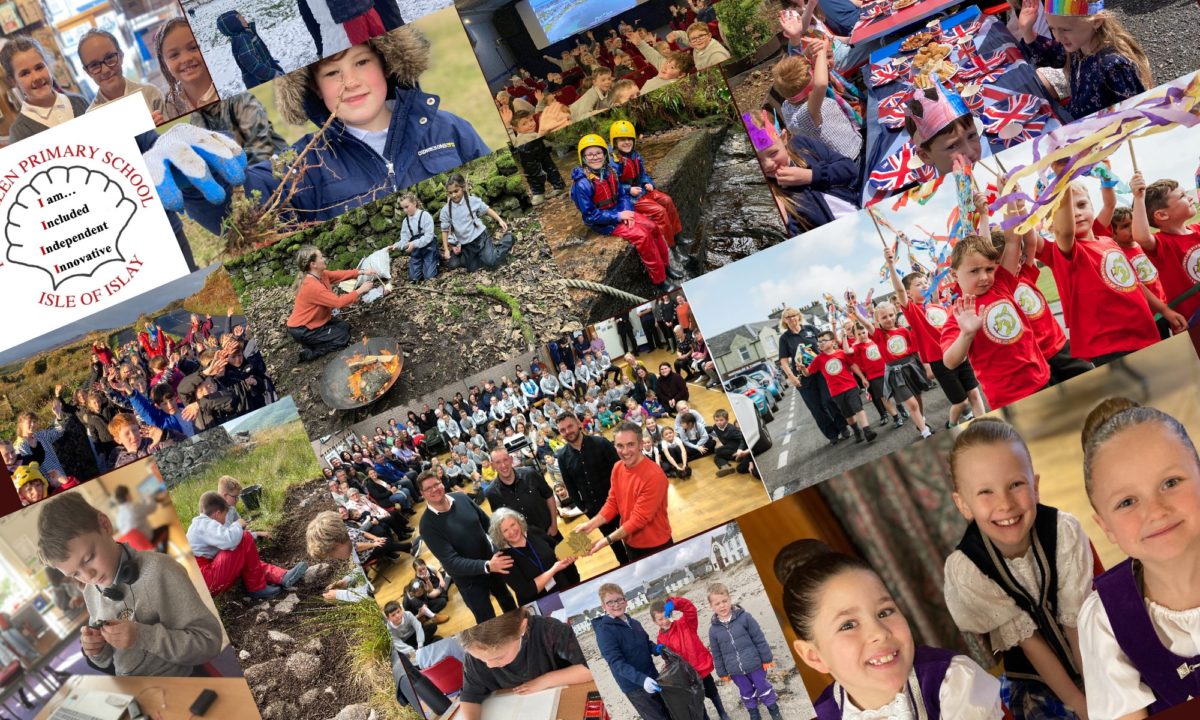

We are pleased and proud to announce Port Ellen were winners of the Eden Award for the most environmentally focussed project at the Rolls-Royce Science Prize 2017-18! According to judges the project was a clear winner due to its real world focus, a strong link to global citizenship and its optimistic, solution focussed approach. Well done everyone for your support in enabling us to win this award. We would like to thank all involved, but in particular the Islay Energy Trust, Neil Chattle our mentor and Rolls-Royce.
You can watch the prize ceremony on the Rolls Royce website, our bit starts at about 1hour in!
About the prize
The Rolls-Royce Science Prize is an annual awards programme that helps teachers implement science teaching ideas in their schools and colleges. The Prize recognises and rewards excellence in Science teaching across the full spectrum of teaching, from special education needs to high ability pupils. It also promotes innovative and sustainable strategies for teaching science which addresses a specific need in the schools or colleges and at the same time contributes to teachers’ continuing professional development.
Port Ellen Primary become Renewables Engineers
Overarching Aim of the Project
Our project has been developed to build children’s understanding and experience of engineering within the context of renewable energy. Port Ellen Primary is a small school on the island of Islay, off the west coast of Scotland. Surrounded by sea and subject to regular strong winds the island is home to the Limpet Wave Station and the strong tidal currents will power an array of underwater turbines at some point in the future. A first community wind turbine is now up and running.
As an Eco-School, children in Port Ellen have a sense of responsibility towards the environment and they are custodians of the local beach. Our project aims to build children’s understanding of renewable energy sources and how clever engineering can address some of the world’s environmental problems.

The first phase of our project was thinking about energy. Our youngest learners explored what makes their toys and appliances work while senior children calculated the school’s Carbon Footprint. At all levels, children then considered the choices we make and how energy impacts on global warming.
 During the second phase of the project all the children visited renewable projects to get first hand experience of their operation and impact. Each class investigated different forms of renewable energy technologies; sun, wind and water. Children were involved in engineering different renewable devices and measuring their efficiency. The final part of the year saw the children become more outward looking to see the part that renewables can contribute to tackling energy needs in developing countries and reduce global warming. Throughout, children were encouraged to develop engineering skills, work co-operatively, be creative, solve problems and review, evaluate and improve their models where possible. Co-operative learning pedagogy is embedded throughout the school and staff are innovative in the way that they approach large-scale projects. Through this project we hope that the children developed the capacity to become successful learners, confident individuals, responsible citizens and effective contributors.
During the second phase of the project all the children visited renewable projects to get first hand experience of their operation and impact. Each class investigated different forms of renewable energy technologies; sun, wind and water. Children were involved in engineering different renewable devices and measuring their efficiency. The final part of the year saw the children become more outward looking to see the part that renewables can contribute to tackling energy needs in developing countries and reduce global warming. Throughout, children were encouraged to develop engineering skills, work co-operatively, be creative, solve problems and review, evaluate and improve their models where possible. Co-operative learning pedagogy is embedded throughout the school and staff are innovative in the way that they approach large-scale projects. Through this project we hope that the children developed the capacity to become successful learners, confident individuals, responsible citizens and effective contributors.

We developed engineering skills through a combination of classwork and extra-curricular clubs. After-school club inspired older children and helped promote STEM careers; a lunchtime club for younger children was run by older pupils who were encouraged to take on a leadership role.
We involved parents and community members as much as possible. We involved the Islay Energy Trust to support us. Islay High School also supported us where possible and we had some Young STEM Ambassadors involved in what we were doing. Links were made with other primary schools on the island. A STEM cluster mentor programme was already organised to begin in 2017-18 and this provided an ideal opportunity to widen the project beyond Port Ellen Primary School, allowing staff and pupils from other schools to benefit from this award.
Success Criteria
About Engineering
• All children in the school will understand the role of an engineer and how engineering aims to solve problems (Assess understanding before/after)
• All girls will have been exposed to positive role models of engineers.
• All children will have had the opportunity to meet an engineer.
Engineering Skills
• All children will have designed and built something that uses renewable energy during the course of the year.
• All staff will be routinely using Engineering Habits of Mind.
• At Early Level all children will use Plan, Do, Review; older children will use Thinking like an Engineer approach to design problems.
• All children will have explored and built models using lots of different materials during the year; their work will be shared and celebrated.
• All children will have had a chance to work in a team, hopefully with pupils from other schools.
Environmental Awarness
• Children in P6/7 will have completed the Carbon Footprint for the School; at the end of the project they will be able to identify ways that the school could reduce it’s impact on the environment.
• The school will have installed an energy meter and record the amount of energy used; some children will be able to explain what uses the most energy and suggest ways that the school could reduce it’s energy consumption.
• Children from P1-P7 will demonstrate their awareness of our impact on the world through the way we live our lives.
• Most children will be able to respond to a news story about an aspect of climate change; older pupils will be able to sort fact from opinion and critically evaluate sources of information. We will create a display for our final presentation.
Science of Energy
• All children will be able to give examples of energy.
• All children will be able to give an example of renewable energy.
• At Early Level, children will be able to explain what makes their toys ‘go’ and talk about what they do.
• At First Level, children will be able to identify and talk about different sources of energy
• At Second Level, children will identify common types of energy. They will be able to explain energy transfers.
Sustainable Living
• All children will demonstrate creative thinking by offering suggestions and solutions to everyday problems
Partnerships
• Partnerships will have been established between the school and Islay Energy Trust
• Parents will respond positively to aspects of the project.
• Cluster schools will have had the opportunity to be involved – hopefully through Engineering Challenges.


